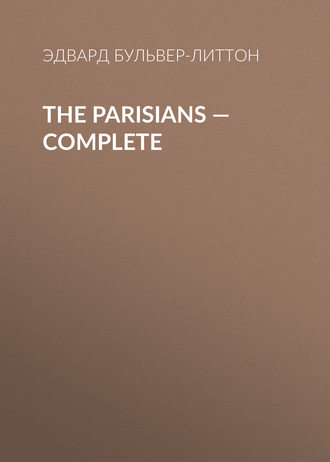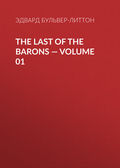
Эдвард Бульвер-Литтон
The Parisians — Complete
CHAPTER X
The Englishman halted at the threshold. His eye, passing rapidly over the figure of Savarin reading in the window-niche, rested upon Rameau and Isaura seated on the same divan, he with her hand clasped in both his own, and bending his face towards hers so closely that a loose tress of her hair seemed to touch his forehead.
The Englishman halted, and no revolution which changes the habitudes and forms of States was ever so sudden as that which passed without a word in the depths of his unconjectured heart. The heart has no history which philosophers can recognize. An ordinary political observer, contemplating the condition of a nation, may very safely tell us what effects must follow the causes patent to his eyes; but the wisest and most far-seeing sage, looking at a man at one o’clock, cannot tell us what revulsions of his whole being may be made ere the clock strike two.
As Isaura rose to greet her visitor, Savarin came from the window-niche, the manuscript in his hand.
“Son of perfidious Albion,” said Savarin, gayly, “we feared you had deserted the French alliance. Welcome back to Paris, and the entente cordiale.”
“Would I could stay to enjoy such welcome! but I must again quit Paris.”
“Soon to return, n’est ce pas? Paris is an irresistible magnet to les beaux esprits. A propos of beaux esprits, be sure to leave orders with your bookseller, if you have one, to enter your name as subscriber to a new journal.”
“Certainly, if Monsieur Savarin recommends it.”
“He recommends it as a matter of course; he writes in it,” said Rameau.
“A sufficient guarantee for its excellence. What is the name of the journal?”
“Not yet thought of,” answered Savarin. “Babes must be born before they are christened; but it will be instruction enough to your bookseller to order the new journal to be edited by Gustave Rameau.”
Bowing ceremoniously to the editor in prospect, Graham said, half ironically, “May I hope that in the department of criticism you will not be too hard upon poor Tasso?”
“Never fear; the Signorina, who adores Tasso, will take him under her special protection,” said Savarin, interrupting Rameau’s sullen and embarrassed reply.
Graham’s brow slightly contracted. “Mademoiselle,” he said, “is then to be united in the conduct of this journal with M. Gustave Rameau?”
“No, indeed!” exclaimed Isaura, somewhat frightened at the idea.
“But I hope,” said Savarin, “that the Signorina may become a contributor too important for an editor to offend by insulting her favourites, Tasso included. Rameau and I came hither to entreat her influence with her intimate and illustrious friend, Madame de Grantmesnil, to insure the success of our undertaking by sanctioning the announcement of her name as a contributor.”
“Upon social questions,—such as the laws of marriage?” said Graham, with a sarcastic smile, which concealed the quiver of his lip and the pain in his voice.
“Nay,” answered Savarin, “our journal will be too sportive, I hope, for matters so profound. We would rather have Madame de Grantmesnil’s aid in some short roman, which will charm the fancy of all and offend the opinions of none. But since I came into the room, I care less for the Signorina’s influence with the great authoress,” and he glanced significantly at the manuscript.
“How so?” asked Graham, his eye following the glance.
“If the writer of this manuscript will conclude what she has begun, we shall be independent of Madame de Grantmesnil.”
“Fie!” cried Isaura, impulsively, her face and neck bathed in blushes,—“fie! such words are a mockery.”
Graham gazed at her intently, and then turned his eyes on Savarin. He guessed aright the truth. “Mademoiselle then is an author? In the style of her friend Madame de Grantmesnil?”
“Bah!” said Savarin, “I should indeed be guilty of mockery if I paid the Signorina so false a compliment as to say that in a first effort she attained to the style of one of the most finished sovereigns of language that has ever swayed the literature of France. When I say, ‘Give us this tale completed, and I shall be consoled if the journal does not gain the aid of Madame de Grantmesnil,’ I mean that in these pages there is that nameless charm of freshness and novelty which compensates for many faults never committed by a practised pen like Madame de Grantmesnil’s. My dear young lady, go on with this story,—finish it; when finished, do not disdain any suggestions I may offer in the way of correction,—and I will venture to predict to you so brilliant a career as author, that you will not regret should you resign for that career the bravoes you could command as actress and singer.”
The Englishman pressed his hand convulsively to his heart, as if smitten by a sudden spasm. But as his eyes rested on Isaura’s face, which had become radiant with the enthusiastic delight of genius when the path it would select opens before it as if by a flash from heaven, whatever of jealous irritation, whatever of selfish pain he might before have felt; was gone, merged in a sentiment of unutterable sadness and compassion. Practical man as he was, he knew so well all the dangers, all the snares, all the sorrows, all the scandals menacing name and fame, that in the world of Paris must beset the fatherless girl who, not less in authorship than on the stage, leaves the safeguard of private life forever behind her, who becomes a prey to the tongues of the public. At Paris, how slender is the line that divides the authoress from the Bohemienne! He sank into his chair silently, and passed his hand over his eyes, as if to shut out a vision of the future.
Isaura in her excitement did not notice the effect on her English visitor. She could not have divined such an effect as possible. On the contrary, even subordinate to her joy at the thought that she had not mistaken the instincts which led her to a nobler vocation than that of the singer, that the cage-bar was opened, and space bathed in sunshine was inviting the new-felt wings,—subordinate even to that joy was a joy more wholly, more simply woman’s. “If,” thought she, in this joy, “if this be true, my proud ambition is realized; all disparities of worth and fortune are annulled between me and him to whom I would bring no shame of mesalliance!” Poor dreamer, poor child!
“You will let me see what you have written,” said Rameau, somewhat imperiously, in the sharp voice habitual to him, and which pierced Graham’s ear like a splinter of glass.
“No, not now; when finished.”
“You will finish it?”
“Oh, yes; how can I help it after such encouragement?” She held out her hand to Savarin, who kissed it gallantly; then her eyes intuitively sought Graham’s. By that time he had recovered his self-possession. He met her look tranquilly, and with a smile; but the smile chilled her, she knew not why.
The conversation then passed upon books and authors of the day, and was chiefly supported by the satirical pleasantries of Savarin, who was in high good-spirits.
Graham, who, as we know, had come with the hope of seeing Isaura alone, and with the intention of uttering words which, however guarded, might yet in absence serve as links of union, now no longer coveted that interview, no longer meditated those words. He soon rose to depart.
“Will you dine with me to-morrow?” asked Savarin. “Perhaps I may induce the Signorina and Rameau to offer you the temptation of meeting them.”
“By to-morrow I shall be leagues away.”
Isaura’s heart sank. This time the manuscript was fairly forgotten.
“You never said you were going so soon,” cried Savarin. “When do you come back, vile deserter?”
“I cannot even guess. Monsieur Rameau, count me among your subscribers. Mademoiselle, my best regards to Signora Venosta. When I see you again, no doubt you will have become famous.”
Isaura here could not control herself. She rose impulsively, and approached him, holding out her hand, and attempting a smile.
“But not famous in the way that you warned me from,” she said in whispered tones. “You are friends with me still?” It was like the piteous wail of a child seeking to make it up with one who wants to quarrel, the child knows not why. Graham was moved, but what could he say? Could he have the right to warn her from this profession also; forbid all desires, all roads of fame to this brilliant aspirant? Even a declared and accepted lover might well have deemed that that would be to ask too much. He replied, “Yes, always a friend, if you could ever need one.” Her hand slid from his, and she turned away wounded to the quick.
“Have you your coupe at the door?” asked Savarin.
“Simply a fiacre.”
“And are going back at once to Paris?”
“Yes.”
“Will you kindly drop me in the Rue de Rivoli?”
“Charmed to be of use.”
CHAPTER XI
As the fiacre bore to Paris Savarin and Graham, the former said, “I cannot conceive what rich simpleton could entertain so high an opinion of Gustave Rameau as to select a man so young, and of reputation though promising so undecided, for an enterprise which requires such a degree of tact and judgment as the conduct of a new journal,—and a journal, too, which is to address itself to the beau monde. However, it is not for me to criticise a selection which brings a god-send to myself.”
“To yourself? You jest; you have a journal of your own. It can only be through an excess of good-nature that you lend your name and pen to the service of M. Gustave Rameau.”
“My good-nature does not go to that extent. It is Rameau who confers a service upon me. Peste! mon cher, we French authors have not the rents of you rich English milords. And though I am the most economical of our tribe, yet that journal of mine has failed me of late; and this morning I did not exactly see how I was to repay a sum I had been obliged to borrow of a money-lender,—for I am too proud to borrow of friends, and too sagacious to borrow of publishers,—when in walks ce cher petit Gustave with an offer, for a few trifles towards starting this new-born journal, which makes a new man of me. Now I am in the undertaking, my amour propre and my reputation are concerned in its success; and I shall take care that collaborateurs of whose company I am not ashamed are in the same boat. But that charming girl, Isaura! What an enigma the gift of the pen is! No one can ever guess who has it until tried.”
“The young lady’s manuscript, then, really merits the praise you bestowed on it?”
“Much more praise, though a great deal of blame, which I did not bestow,—for in a first work faults insure success as much as beauties. Anything better than tame correctness. Yes, her first work, to judge by what is written, must make a hit,—a great hit. And that will decide her career. A singer, an actress, may retire,—often does when she marries an author; but once an author always an author.”
“Ah! is it so? If you had a beloved daughter, Savarin, would you encourage her to be an author?”
“Frankly, no: principally because in that case the chances are that she would marry an author; and French authors, at least in the imaginative school, make very uncomfortable husbands.”
“Ah! you think the Signorina will marry one of those uncomfortable husbands,—M. Rameau, perhaps?”
“Rameau! Hein! nothing more likely. That beautiful face of his has its fascination. And to tell you the truth, my wife, who is a striking illustration of the truth that what woman wills heaven wills, is bent upon that improvement in Gustave’s moral life which she thinks a union with Mademoiselle Cicogna would achieve. At all events, the fair Italian would have in Rameau a husband who would not suffer her to bury her talents under a bushel. If she succeeds as a writer (by succeeding I mean making money), he will see that her ink-bottle is never empty; and if she don’t succeed as a writer, he will take care that the world shall gain an actress or a singer. For Gustave Rameau has a great taste for luxury and show; and whatever his wife can make, I will venture to say that he will manage to spend.”
“I thought you had an esteem and regard for Mademoiselle Cicogna. It is Madame your wife, I suppose, who has a grudge against her?”
“On the contrary, my wife idolizes her.”
“Savages sacrifice to their idols the things they deem of value; civilized Parisians sacrifice their idols themselves, and to a thing that is worthless.”
“Rameau is not worthless; he has beauty and youth and talent. My wife thinks more highly of him than I do; but I must respect a man who has found admirers so sincere as to set him up in a journal, and give him carte blanche for terms to contributors. I know of no man in Paris more valuable to me. His worth to me this morning is thirty thousand francs. I own I do not think him likely to be a very safe husband; but then French female authors and artists seldom take any husbands except upon short leases. There are no vulgar connubial prejudices in the pure atmosphere of art. Women of genius, like Madame de Grantmesnil, and perhaps like our charming young friend, resemble canary-birds,—to sing their best you must separate them from their mates.”
The Englishman suppressed a groan, and turned the conversation.
When he had set down his lively companion, Vane dismissed his fiacre, and walked to his lodgings musingly.
“No,” he said inly; “I must wrench myself from the very memory of that haunting face,—the friend and pupil of Madame de Grantmesnil, the associate of Gustave Rameau, the rival of Julie Caumartin, the aspirant to that pure atmosphere of art in which there are no vulgar connubial prejudices! Could I—whether I be rich or poor—see in her the ideal of an English wife? As it is—as it is—with this mystery which oppresses me, which, till solved, leaves my own career insoluble,—as it is, how fortunate that I did not find her alone; did not utter the words that would fain have leaped from my heart; did not say, ‘I may not be the rich man I seem, but in that case I shall be yet more ambitious, because struggle and labour are the sinews of ambition! Should I be rich, will you adorn my station? Should I be poor, will you enrich poverty with your smile? And can you, in either case, forego—really, painlessly forego, as you led me to hope—the pride in your own art?’ My ambition were killed did I marry an actress, a singer. Better that than the hungerer after excitements which are never allayed, the struggler in a career which admits of no retirement,—the woman to whom marriage is no goal, who remains to the last the property of the public, and glories to dwell in a house of glass into which every bystander has a right to peer. Is this the ideal of an Englishman’s wife and home? No, no!—woe is me, no!”
BOOK VI
CHAPTER I
A few weeks after the date of the preceding chapter, a gay party of men were assembled at supper in one of the private salons of the Maison Doree. The supper was given by Frederic Lemercier, and the guests were, though in various ways, more or less distinguished. Rank and fashion were not unworthily represented by Alain de Rochebriant and Enguerrand de Vandemar, by whose supremacy as “lion” Frederic still felt rather humbled, though Alain had contrived to bring them familiarly together. Art, Literature, and the Bourse had also their representatives in Henri Bernard, a rising young portrait-painter, whom the Emperor honoured with his patronage, the Vicomte de Braze, and M. Savarin. Science was not altogether forgotten, but contributed its agreeable delegate in the person of the eminent physician to whom we have been before introduced,—Dr. Bacourt. Doctors in Paris are not so serious as they mostly are in London; and Bacourt, a pleasant philosopher of the school of Aristippus, was no unfrequent nor ungenial guest at any banquet in which the Graces relaxed their zones. Martial glory was also represented at that social gathering by a warrior, bronzed and decorated, lately arrived from Algiers, on which arid soil he had achieved many laurels and the rank of Colonel. Finance contributed Duplessis. Well it might; for Duplessis had just assisted the host to a splendid coup at the Bourse.
“Ah, cher Monsieur Savarin,” says Enguerrand de Vandemar, whose patrician blood is so pure from revolutionary taint that he is always instinctively polite, “what a masterpiece in its way is that little paper of yours in the ‘Sens Commun,’ upon the connection between the national character and the national diet! so genuinely witty!—for wit is but truth made amusing.”
“You flatter me,” replied Savarin, modestly; “but I own I do think there is a smattering of philosophy in that trifle. Perhaps, however, the character of a people depends more on its drinks than its food. The wines of Italy, heady, irritable, ruinous to the digestion, contribute to the character which belongs to active brains and disordered livers. The Italians conceive great plans, but they cannot digest them. The English common-people drink beer, and the beerish character is stolid, rude, but stubborn and enduring. The English middle-class imbibe port and sherry; and with these strong potations their ideas become obfuscated. Their character has no liveliness; amusement is not one of their wants; they sit at home after dinner and doze away the fumes of their beverage in the dulness of domesticity. If the English aristocracy are more vivacious and cosmopolitan, it is thanks to the wines of France, which it is the mode with them to prefer; but still, like all plagiarists, they are imitators, not inventors; they borrow our wines and copy our manners. The Germans—”
“Insolent barbarians!” growled the French Colonel, twirling his mustache; “if the Emperor were not in his dotage, their Sadowa would ere this have cost them their Rhine.”
“The Germans,” resumed Savarin, unheeding the interruption, “drink acrid wines, varied with beer, to which last their commonalty owes a quasi resemblance in stupidity and endurance to the English masses. Acrid wines rot the teeth Germans are afflicted with toothache from infancy. All people subject to toothache are sentimental. Goethe was a martyr to toothache. ‘Werther’ was written in one of those paroxysms which predispose genius to suicide. But the German character is not all toothache; beer and tobacco step in to the relief of Rhenish acridities, blend philosophy with sentiment, and give that patience in detail which distinguishes their professors and their generals. Besides, the German wines in themselves have other qualities than that of acridity. Taken with sourkrout and stewed prunes, they produce fumes of self-conceit. A German has little of French vanity; he has German self-esteem. He extends the esteem of self to those around him; his home, his village, his city, his country,—all belong to him. It is a duty he owes to himself to defend them. Give him his pipe and his sabre, and, Monsieur le Colonel, believe me, you will never take the Rhine from him.”
“P-r-r,” cried the Colonel; “but we have had the Rhine.”
“We did not keep it. And I should not say I had a francpiece if I borrowed it from your purse and had to give it back the next day.”
Here there arose a very general hubbub of voices, all raised against M. Savarin. Enguerrand, like a man of good ton, hastened to change the conversation.
“Let us leave these poor wretches to their sour wines and toothaches. We drinkers of the champagne, all our own, have only pity for the rest of the human race. This new journal ‘Le Sens Commun’ has a strange title, Monsieur Savarin.”
“Yes; ‘Le Sens Commun’ is not common in Paris, where we all have too much genius for a thing so vulgar.”
“Pray,” said the young painter, “tell me what you mean by the title ‘Le Sens Commun.’ It is mysterious.”
“True,” said Savarin; “it may mean the Sensus communis of the Latins, or the Good Sense of the English. The Latin phrase signifies the sense of the common interest; the English phrase, the sense which persons of understanding have in common. I suppose the inventor of our title meant the latter signification.”
“And who was the inventor?” asked Bacourt.
“That is a secret which I do not know myself,” answered Savarin.
“I guess,” said Enguerrand, “that it must be the same person who writes the political leaders. They are most remarkable; for they are so unlike the articles in other journals, whether those journals be the best or the worst. For my own part, I trouble my head very little about politics, and shrug my shoulders at essays which reduce the government of flesh and blood into mathematical problems. But these articles seem to be written by a man of the world, and as a man of the world myself, I read them.”
“But,” said the Vicomte de Breze, who piqued himself on the polish of his style, “they are certainly not the composition of any eminent writer. No eloquence, no sentiment; though I ought not to speak disparagingly of a fellow-contributor.”
“All that may be very true;” said Savarin; “but M. Enguerrand is right. The papers are evidently the work of a man of the world, and it is for that reason that they have startled the public, and established the success of ‘Le Sens Commun.’ But wait a week or two longer, Messieurs, and then tell me what you think of a new roman by a new writer, which we shall announce in our impression to-morrow. I shall be disappointed, indeed, if that does not charm you. No lack of eloquence and sentiment there.”
“I am rather tired of eloquence and sentiment,” said Enguerrand. “Your editor, Gustave Rameau, sickens me of them with his ‘Starlit Meditations in the Streets of Paris,’ morbid imitations of Heine’s enigmatical ‘Evening Songs.’ Your journal would be perfect if you could suppress the editor.”
“Suppress Gustave Rameau!” cried Bernard, the painter; “I adore his poems, full of heart for poor suffering humanity.”
“Suffering humanity so far as it is packed up in himself,” said the physician, dryly,—“and a great deal of the suffering is bile. But a propos of your new journal, Savarin, there is a paragraph in it to-day which excites my curiosity. It says that the Vicomte de Mauleon has arrived in Paris, after many years of foreign travel; and then, referring modestly enough to the reputation for talent which he had acquired in early youth, proceeds to indulge in a prophecy of the future political career of a man who, if he have a grain of sens common, must think that the less said about him the better. I remember him well; a terrible mauvais sujet, but superbly handsome. There was a shocking story about the jewels of a foreign duchess, which obliged him to leave Paris.”
“But,” said Savarin, “the paragraph you refer to hints that that story is a groundless calumny, and that the true reason for De Mauleon’s voluntary self-exile was a very common one among young Parisians,—he had lavished away his fortune. He returns, when, either by heritage or his own exertions, he has secured elsewhere a competence.”
“Nevertheless I cannot think that society will receive him,” said Bacourt. “When he left Paris, there was one joyous sigh of relief among all men who wished to avoid duels, and keep their wives out of temptation. Society may welcome back a lost sheep, but not a reinvigorated wolf.”
“I beg your pardon, mon cher,” said Enguerrand; “society has already opened its fold to this poor ill-treated wolf. Two days ago Louvier summoned to his house the surviving relations or connections of De Mauleon—among whom are the Marquis de Rochebriant, the Counts de Passy, De Beauvilliers, De Chavigny, my father, and of course his two sons—and submitted to us the proofs which completely clear the Vicomte de Mauleon of even a suspicion of fraud or dishonour in the affair of the jewels. The proofs include the written attestation of the Duke himself, and letters from that nobleman after De Mauleon’s disappearance from Paris, expressive of great esteem, and indeed, of great admiration, for the Vicomte’s sense of honour and generosity of character. The result of this family council was that we all went in a body to call on De Mauleon; and he dined with my father that same day. You know enough of the Comte de Vandemar, and, I may add, of my mother, to be sure that they are both, in their several ways, too regardful of social conventions to lend their countenance even to a relation without well weighing the pros and cons. And as for Raoul, Bayard himself could not be a greater stickler on the point of honour.”
This declaration was followed by a silence that had the character of stupor.
At last Duplessis said, “But what has Louvier to do in this galere? Louvier is no relation of that well-born vaurien; why should he summon your family council?”
“Louvier excused his interference on the ground of early and intimate friendship with De Mauleon, who, he said, came to consult him on arriving at Paris, and who felt too proud or too timid to address relations with whom he had long dropped all intercourse. An intermediary was required, and Louvier volunteered to take that part on himself; nothing more natural nor more simple. By the way, Alain, you dine with Louvier to-morrow, do you not?—a dinner in honour of our rehabilitated kinsman. I and Raoul go.”
“Yes, I shall be charmed to meet again a man who, whatever might be his errors in youth, on which,” added Alain, slightly colouring, “it certainly does not become me to be severe, must have suffered the most poignant anguish a man of honour can undergo,—namely, honour suspected; and who now, whether by years or sorrow, is so changed that I cannot recognize a likeness to the character I have just heard given to him as mauvais sujet and vaurien.”
“Bravo!” cried Enguerrand; “all honour to courage!—and at Paris it requires great courage to defend the absent.”
“Nay,” answered Alain, in a low voice. “The gentilhomme who will not defend another gentilhomme traduced, would, as a soldier, betray a citadel and desert a flag.”
“You say M. de Mauleon is changed,” said De Breze; “yes, he must be growing old. No trace left of his good looks?”
“Pardon me,” said Enguerrand; “he is bien conserve, and has still a very handsome head and an imposing presence. But one cannot help doubting whether he deserved the formidable reputation he acquired in youth; his manner is so singularly mild and gentle, his conversation so winningly modest, so void of pretence, and his mode of life is as simple as that of a Spanish hidalgo.”
“He does not, then, affect the role of Monte Cristo,” said Duplessis, “and buy himself into notice like that hero of romance?”
“Certainly not: he says very frankly that he has but a very small income, but more than enough for his wants,—richer than in his youth, for he has learned content. We may dismiss the hint in ‘Le Sens Commun’ about his future political career,—at least he evinces no such ambition.”
“How could he as a Legitimist?” said Alain, bitterly. “What department would elect him?”
“But is he a Legitimist?” asked De Breze.
“I take it for granted that he must be that,” answered Alain, haughtily, “for he is a De Mauleon.”
“His father was as good a De Mauleon as himself, I presume,” rejoined De Breze, dryly; “and he enjoyed a place at the Court of Louis Philippe, which a Legitimist could scarcely accept. Victor did not, I fancy, trouble his head about politics at all, at the time I remember him; but to judge by his chief associates, and the notice he received from the Princes of the House of Orleans, I should guess that he had no predilections in favour of Henri V.”
“I should regret to think so,” said Alain, yet more haughtily, “since the De Mauleons acknowledge the head of their house in the representative of the Rochebriants.”
“At all events,” said Duplessis, “M. de Mauleon appears to be a philosopher of rare stamp. A Parisian who has known riches and is contented to be poor is a phenomenon I should like to study.”
“You have that chance to-morrow evening, Monsieur Duplessis,” said Enguerrand.
“What! at M. Louvier’s dinner? Nay, I have no other acquaintance with M. Louvier than that of the Bourse, and the acquaintance is not cordial.”
“I did not mean at M. Louvier’s dinner, but at the Duchesse de Tarascon’s ball. You, as one of her special favourites, will doubtless honour her reunion.”
“Yes; I have promised my daughter to go to the ball. But the Duchesse is Imperialist. M. de Mauleon seems to be either a Legitimist, according to Monsieur le Marquis, or an Orleanist, according to our friend De Breze.”
“What of that? Can there be a more loyal Bourbonite than De Rochebriant?—and he goes to the ball. It is given out of the season, in celebration of a family marriage. And the Duchesse de Tarascon is connected with Alain, and therefore with De Mauleon, though but distantly.”
“Ah! excuse my ignorance of genealogy.”
“As if the genealogy of noble names were not the history of France,” muttered Alain, indignantly.







